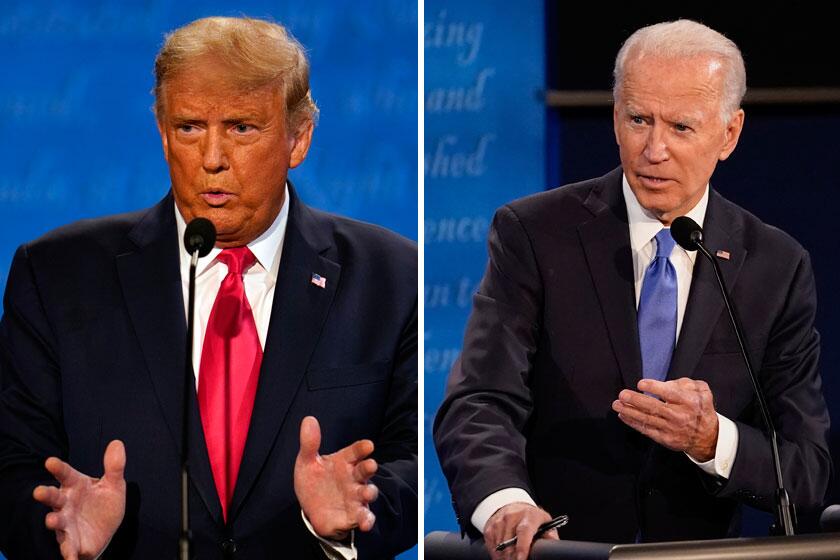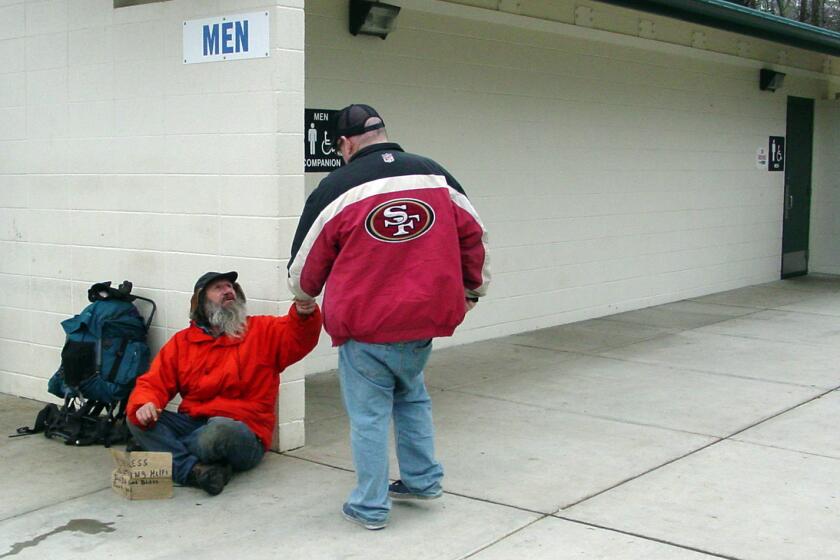9th Circuit conservatives blast homelessness ruling, say issue is ‘paralyzing’ U.S. West
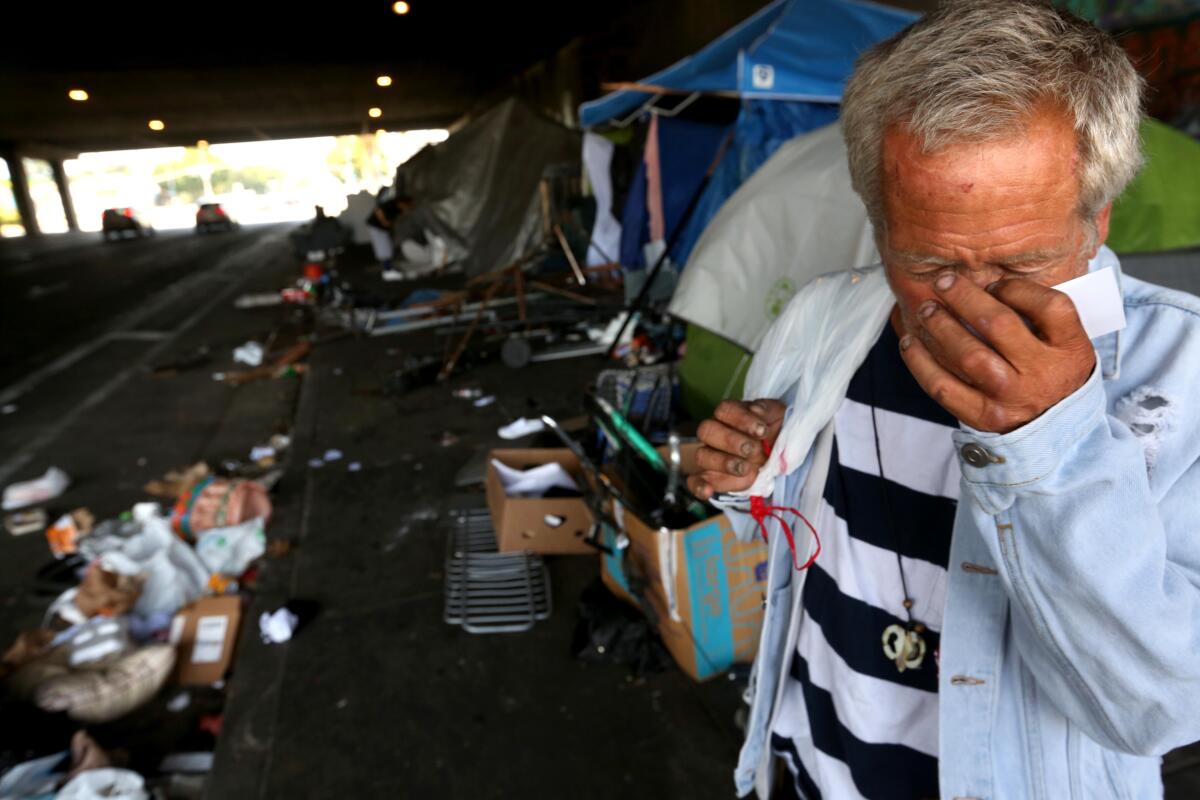
- Share via
Some of the most powerful conservative judges in the United States took collective aim Wednesday at the idea that homeless people with nowhere else to go have a right to sleep in public, excoriating their liberal colleagues for ruling as much.
Their scathing comments came in a set of responses to a decision Wednesday by the U.S. 9th Circuit Court of Appeals not to rehear a case in which a smaller three-judge panel affirmed such rights in September.
In their responses, the court’s conservative wing painted a dystopian portrait of an American West deprived of its public spaces and under siege by an overwhelming epidemic of homelessness.
The debate provided one of the clearest windows into the new political divide on the 9th Circuit since President Trump appointed 10 judges to the traditionally liberal court and President Biden appointed seven.
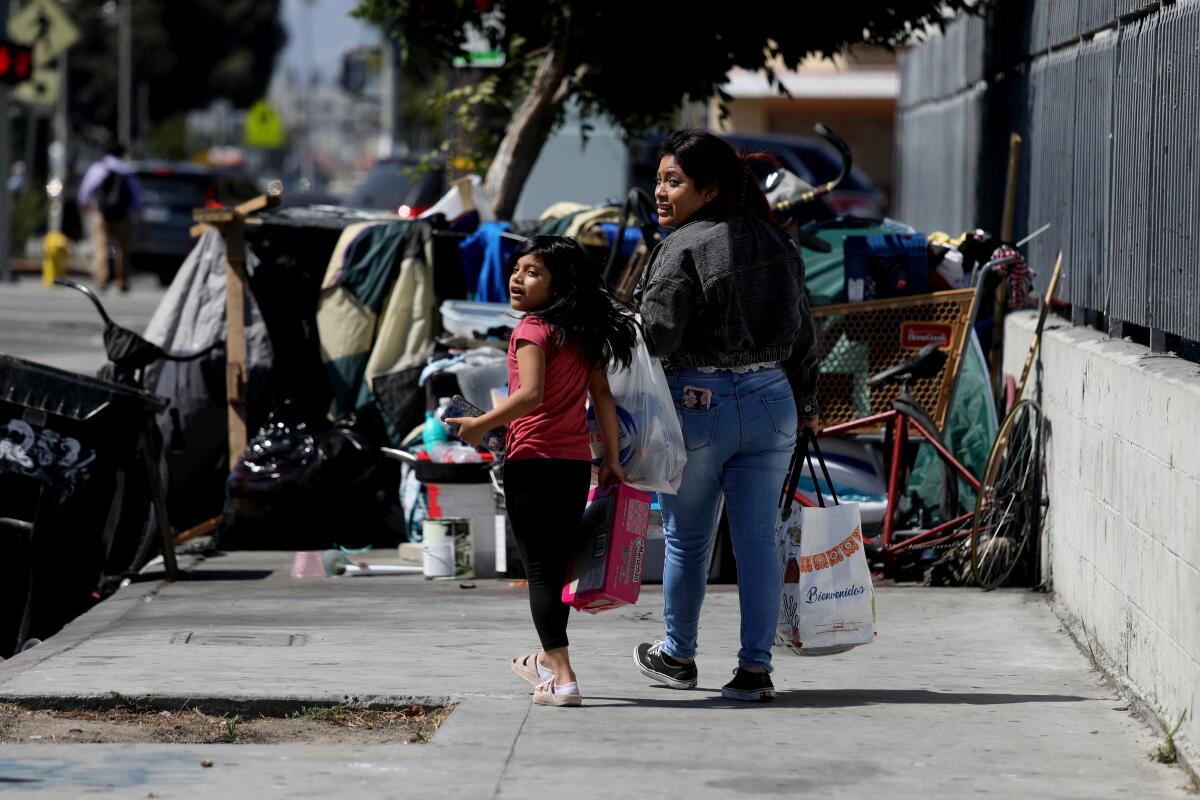
Judge Milan Smith Jr., one of the court’s older conservative judges who was appointed by President George W. Bush, wrote in one dissent that homelessness is “presently the defining public health and safety crisis in the western United States.”
He then zoomed in on California and Los Angeles in particular — where recent estimates have put the homeless population of L.A. County about 70,000.
President Biden has appointed six judges to the U.S. 9th Circuit Court of Appeals and has two more on the way, but hasn’t matched Trump’s impact on the court.
“There are stretches of the city where one cannot help but think the government has shirked its most basic responsibilities under the social contract: providing public safety and ensuring that public spaces remain open to all,” Smith wrote. “One-time public spaces like parks — many of which provide scarce outdoor space in dense, working-class neighborhoods — are filled with thousands of tents and makeshift structures, and are no longer welcoming to the broader community.”
Eight other conservative judges signed onto Smith’s dissent in whole or in part.
Judge Diarmuid O’Scannlain, an older conservative judge appointed by President Reagan, wrote in a separate statement that the position of the court’s liberal wing was “egregiously flawed and deeply damaging,” and blaming it for “paralyzing local communities from addressing the pressing issue of homelessness.”
U.S. Navy veteran Kevin H., standing next to his encampment in Culver City. (Genaro Molina / Los Angeles)
O’Scannlain wrote that the decision “now effectively guarantees a personal federal constitutional ‘right’ for individuals to camp or to sleep on sidewalks and in parks, playgrounds, and other public places in defiance of traditional health, safety, and welfare laws,” which he called “a dubious holding premised on a fanciful interpretation of the 8th Amendment.”
O’Scannlain was joined in part by Smith and in full by 13 other conservatives on the court.
In its 2-1 ruling in September, a liberal-leaning three-judge panel of the appellate court — which covers a huge swath of the West, including California — overturned as unconstitutional a set of local ordinances in Grants Pass, Ore., that barred homeless people from sleeping in certain public areas.
The decision reiterated a separate 2018 decision in which another 9th Circuit panel had found that the 8th Amendment “prohibits the imposition of criminal penalties for sitting, sleeping, or lying outside on public property for homeless individuals who cannot obtain shelter.”
When a three-judge 9th Circuit panel issues a ruling, parties may appeal by requesting that the case be reheard “en banc” — or before a larger, 11-judge panel. The city of Grants Pass did so in this case November, arguing that the smaller panel had misapplied the law and allowed homelessness to spread.
On Wednesday, the 9th Circuit issued an order denying the city’s request, indicating a majority of its 29 active judges had voted against rehearing the case.
Their vote for declining to rehear the case was not made public. However, it is clear from the dissents — and the number of conservative judges who signed onto them — that the court’s liberal wing, which has been bolstered under Biden’s administration, was entirely responsible for the decision.
In his statement, O’Scannlain said the majority’s opinion that the 8th Amendment affirms the right of homeless people to sleep in public with rudimentary bedding materials such as blankets and pillows when they have no where else to go breaks with findings out of the U.S. Supreme Court and other circuits in the country on “an issue of exceptional importance.”
O’Scannlain wrote that the September decision was an “inventive, judge-made novelty.” He said it is “telling” that the 9th Circuit is the only circuit “bold enough” to embrace such a doctrine, which he said “effectively requires local communities to surrender their sidewalks and other public places to homeless encampments.”
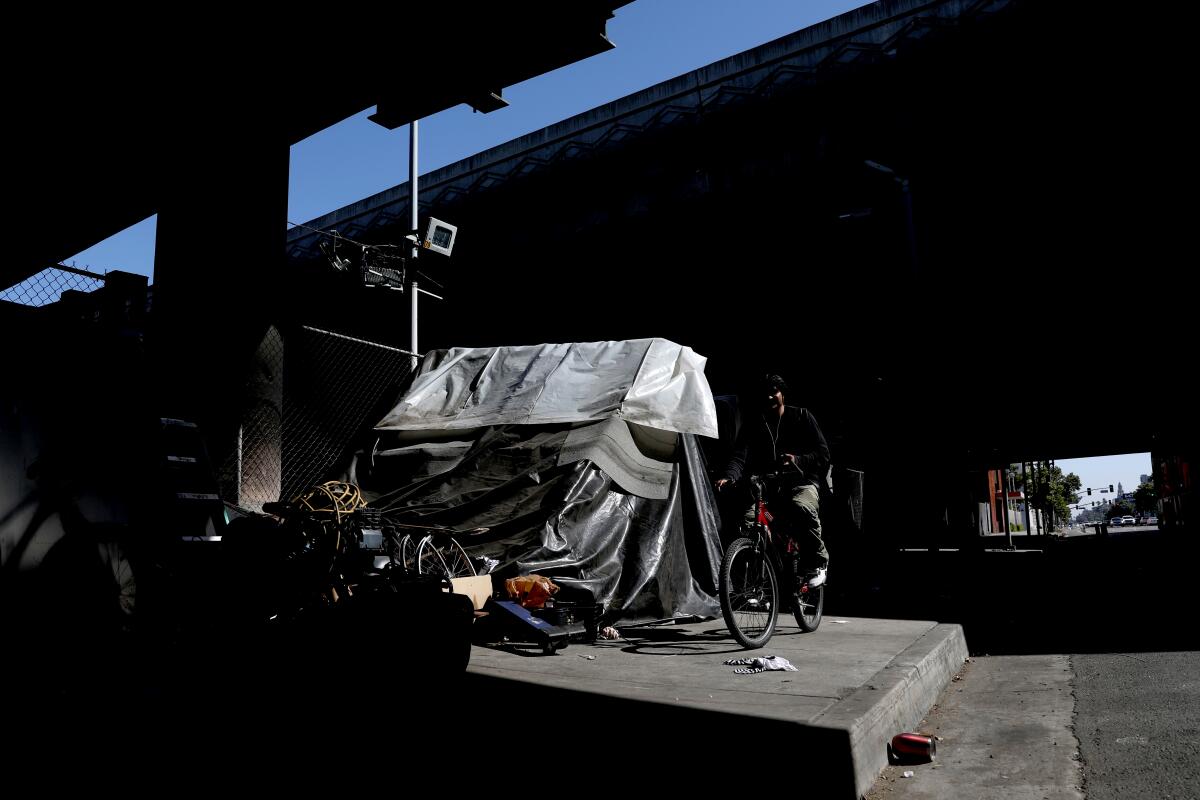
Like Smith, O’Scannlain also carved out special attention for California.
“One need only walk through our neighborhoods — through the Tenderloin (San Francisco) or Skid Row (Los Angeles) — to know that our communities are fast coming undone,” he wrote. “Tents crowding out sidewalks, needles flooding parks, and rubbish (and worse) marring public squares reflect a threat to the public welfare that should not be taken lightly.”
In such blighted areas as the Tenderloin and Skid Row, he wrote, the court should not be “eager to throw caution to the wind and to embrace judicial adventurism.”
In a dissent written by Judge Daniel Bress, a Trump appointee, and joined by 11 other conservative judges, Bress wrote that “the most pressing problems plaguing big-city America” were in plain view from the windows of the 9th Circuit’s courthouse in San Francisco.
“Homelessness, drug addiction, barely concealed narcotics dealing, severe mental health impairment, the post-COVID hollowing out of our business districts.”
Such problems defy easy solutions, Bress wrote, but will be made even worse by the majority’s decision in the Grants Pass case, in which he said the court had “injected itself into the mix” by imposing “sharp limits” on local government responses.
Such “judge-made rules governing who can sit and sleep where,” Bress wrote, will have negative effects not just at the state and city levels, but “block by block, building by building, doorway by doorway.”
The U.S. 9th Circuit Court of Appeals expanded protections for homeless people sleeping outdoors in a decision with ramifications for other cities, including L.A.
Pushing back against the court’s conservatives were the same two liberal judges who made the decision in September: Judge Roslyn O. Silver of the U.S. District Court of Arizona, a visiting judge on the appellate panel who wrote for the three-judge panel in September, and 9th Circuit Court Judge Ronald M. Gould. Both are appointees of President Clinton.
Silver and Gould wrote that both Smith’s dissent and O’Scannlain’s statement “significantly exaggerate” their September holding — which related specifically to homeless people sleeping outside in Grants Pass, a city that lacked sufficient shelter beds to house them.
The ruling, they wrote, “holds only that governments cannot criminalize the act of sleeping with the use of rudimentary protections, such as bedding, from the elements in some public places when a person has nowhere else to sleep.”
The ruling “does not establish an unrestrained right for involuntarily homeless persons to sleep anywhere they choose,” Silver and Gould wrote. “Nor does it require jurisdictions to cede all public spaces to involuntarily homeless persons.”
Silver and Gould wrote that, contrary to suggestions by Smith, the homelessness problem in the American West and across the U.S. predates both the 2018 and September decisions by the 9th Circuit that upheld a right of homeless people to sleep outside with bedding when they have nowhere else to go.
“It is implausible to argue the crisis would abate if jurisdictions in the 9th Circuit regained the authority to punish involuntarily homeless persons for sleeping in public with blankets,” they wrote.
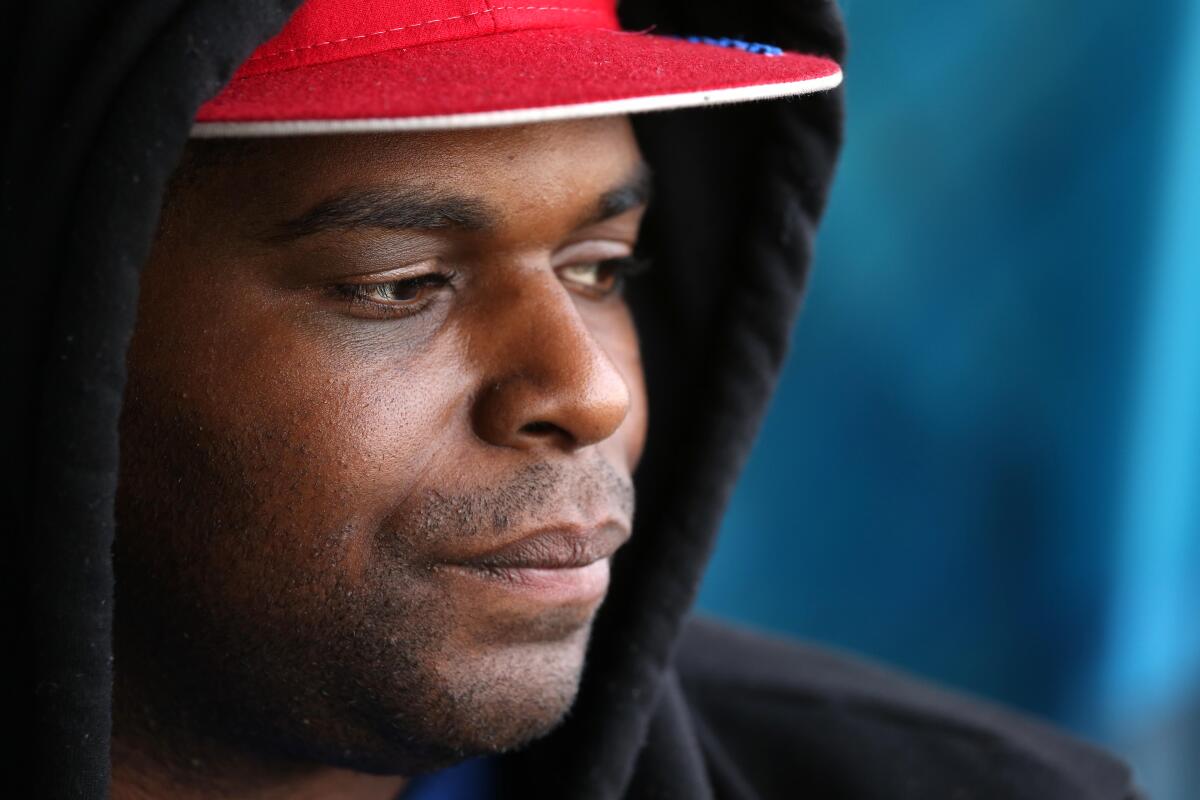
Legal experts said the conservative wing’s vociferous responses rejecting the majority opinion Wednesday were a clear signal to the conservative-leaning U.S. Supreme Court that it should take up the case next.
Theane Evangelis, an attorney for Grants Pass, said the city would petition the Supreme Court to do just that, as it believes the decisions of the 9th Circuit in 2018 and in September “have contributed to the growing problem of encampments in cities across the West” and “are only harming the very people they were meant to help.”
Ed Johnson, director of litigation at the Oregon Law Center who helped represent the homeless people who sued Grants Pass over its homeless statutes, said they were pleased with the decision to deny a rehearing. He otherwise declined to comment.
More to Read
Sign up for Essential California
The most important California stories and recommendations in your inbox every morning.
You may occasionally receive promotional content from the Los Angeles Times.

